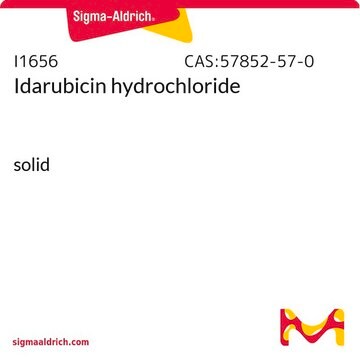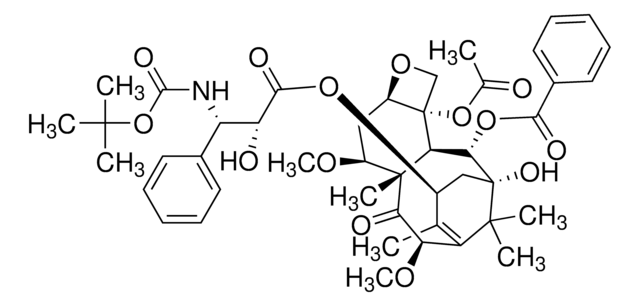M6545
Mitoxantrone dihydrochloride
≥97% (HPLC)
Synonym(s):
1,4-Dihydroxy-5,8-bis[[2-[(2-hydroxyethyl)amino]ethyl]amino]-9,10-anthracenedione dihydrochloride
About This Item
Recommended Products
Assay
≥97% (HPLC)
SMILES string
Cl[H].Cl[H].OCCNCCNc1ccc(NCCNCCO)c2C(=O)c3c(O)ccc(O)c3C(=O)c12
InChI
1S/C22H28N4O6.2ClH/c27-11-9-23-5-7-25-13-1-2-14(26-8-6-24-10-12-28)18-17(13)21(31)19-15(29)3-4-16(30)20(19)22(18)32;;/h1-4,23-30H,5-12H2;2*1H
InChI key
ZAHQPTJLOCWVPG-UHFFFAOYSA-N
Gene Information
human ... TOP2A(7153)
Looking for similar products? Visit Product Comparison Guide
Application
- to induce calreticulin surface expression in cells
- as a genotoxin agent
- as a topoisomerase inhibitor
Biochem/physiol Actions
Signal Word
Danger
Hazard Statements
Precautionary Statements
Hazard Classifications
Muta. 1B - Repr. 1B
Storage Class Code
6.1C - Combustible acute toxic Cat.3 / toxic compounds or compounds which causing chronic effects
WGK
WGK 3
Flash Point(F)
Not applicable
Flash Point(C)
Not applicable
Personal Protective Equipment
Certificates of Analysis (COA)
Search for Certificates of Analysis (COA) by entering the products Lot/Batch Number. Lot and Batch Numbers can be found on a product’s label following the words ‘Lot’ or ‘Batch’.
Already Own This Product?
Find documentation for the products that you have recently purchased in the Document Library.
Customers Also Viewed
Articles
DNA damage and repair mechanism is vital for maintaining DNA integrity. Damage to cellular DNA is involved in mutagenesis, the development of cancer among others.
Our team of scientists has experience in all areas of research including Life Science, Material Science, Chemical Synthesis, Chromatography, Analytical and many others.
Contact Technical Service














